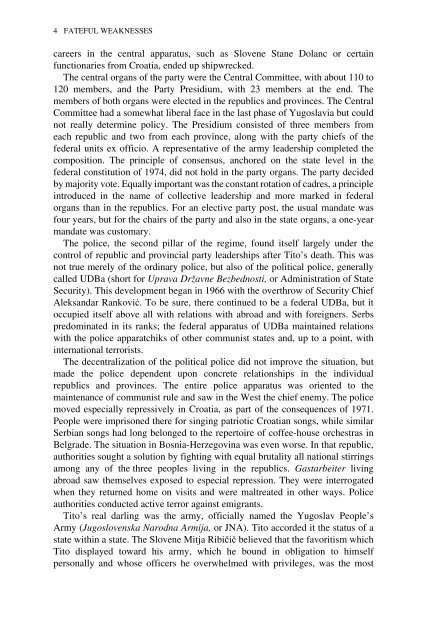Yugoslavia: A History of its Demise - Indymedia
Yugoslavia: A History of its Demise - Indymedia
Yugoslavia: A History of its Demise - Indymedia
Create successful ePaper yourself
Turn your PDF publications into a flip-book with our unique Google optimized e-Paper software.
4 FATEFUL WEAKNESSES<br />
careers in the central apparatus, such as Slovene Stane Dolanc or certain<br />
functionaries from Croatia, ended up shipwrecked.<br />
The central organs <strong>of</strong> the party were the Central Committee, with about 110 to<br />
120 members, and the Party Presidium, with 23 members at the end. The<br />
members <strong>of</strong> both organs were elected in the republics and provinces. The Central<br />
Committee had a somewhat liberal face in the last phase <strong>of</strong> <strong>Yugoslavia</strong> but could<br />
not really determine policy. The Presidium consisted <strong>of</strong> three members from<br />
each republic and two from each province, along with the party chiefs <strong>of</strong> the<br />
federal un<strong>its</strong> ex <strong>of</strong>ficio. A representative <strong>of</strong> the army leadership completed the<br />
composition. The principle <strong>of</strong> consensus, anchored on the state level in the<br />
federal constitution <strong>of</strong> 1974, did not hold in the party organs. The party decided<br />
by majority vote. Equally important was the constant rotation <strong>of</strong> cadres, a principle<br />
introduced in the name <strong>of</strong> collective leadership and more marked in federal<br />
organs than in the republics. For an elective party post, the usual mandate was<br />
four years, but for the chairs <strong>of</strong> the party and also in the state organs, a one-year<br />
mandate was customary.<br />
The police, the second pillar <strong>of</strong> the regime, found <strong>its</strong>elf largely under the<br />
control <strong>of</strong> republic and provincial party leaderships after Tito’s death. This was<br />
not true merely <strong>of</strong> the ordinary police, but also <strong>of</strong> the political police, generally<br />
called UDBa (short for Uprava Državne Bezbednosti, or Administration <strong>of</strong> State<br />
Security). This development began in 1966 with the overthrow <strong>of</strong> Security Chief<br />
Aleksandar Ranković. To be sure, there continued to be a federal UDBa, but it<br />
occupied <strong>its</strong>elf above all with relations with abroad and with foreigners. Serbs<br />
predominated in <strong>its</strong> ranks; the federal apparatus <strong>of</strong> UDBa maintained relations<br />
with the police apparatchiks <strong>of</strong> other communist states and, up to a point, with<br />
international terrorists.<br />
The decentralization <strong>of</strong> the political police did not improve the situation, but<br />
made the police dependent upon concrete relationships in the individual<br />
republics and provinces. The entire police apparatus was oriented to the<br />
maintenance <strong>of</strong> communist rule and saw in the West the chief enemy. The police<br />
moved especially repressively in Croatia, as part <strong>of</strong> the consequences <strong>of</strong> 1971.<br />
People were imprisoned there for singing patriotic Croatian songs, while similar<br />
Serbian songs had long belonged to the repertoire <strong>of</strong> c<strong>of</strong>fee-house orchestras in<br />
Belgrade. The situation in Bosnia-Herzegovina was even worse. In that republic,<br />
authorities sought a solution by fighting with equal brutality all national stirrings<br />
among any <strong>of</strong> the three peoples living in the republics. Gastarbeiter living<br />
abroad saw themselves exposed to especial repression. They were interrogated<br />
when they returned home on vis<strong>its</strong> and were maltreated in other ways. Police<br />
authorities conducted active terror against emigrants.<br />
Tito’s real darling was the army, <strong>of</strong>ficially named the Yugoslav People’s<br />
Army (Jugoslovenska Narodna Armija, or JNA). Tito accorded it the status <strong>of</strong> a<br />
state within a state. The Slovene Mitja Ribičič believed that the favoritism which<br />
Tito displayed toward his army, which he bound in obligation to himself<br />
personally and whose <strong>of</strong>ficers he overwhelmed with privileges, was the most
















